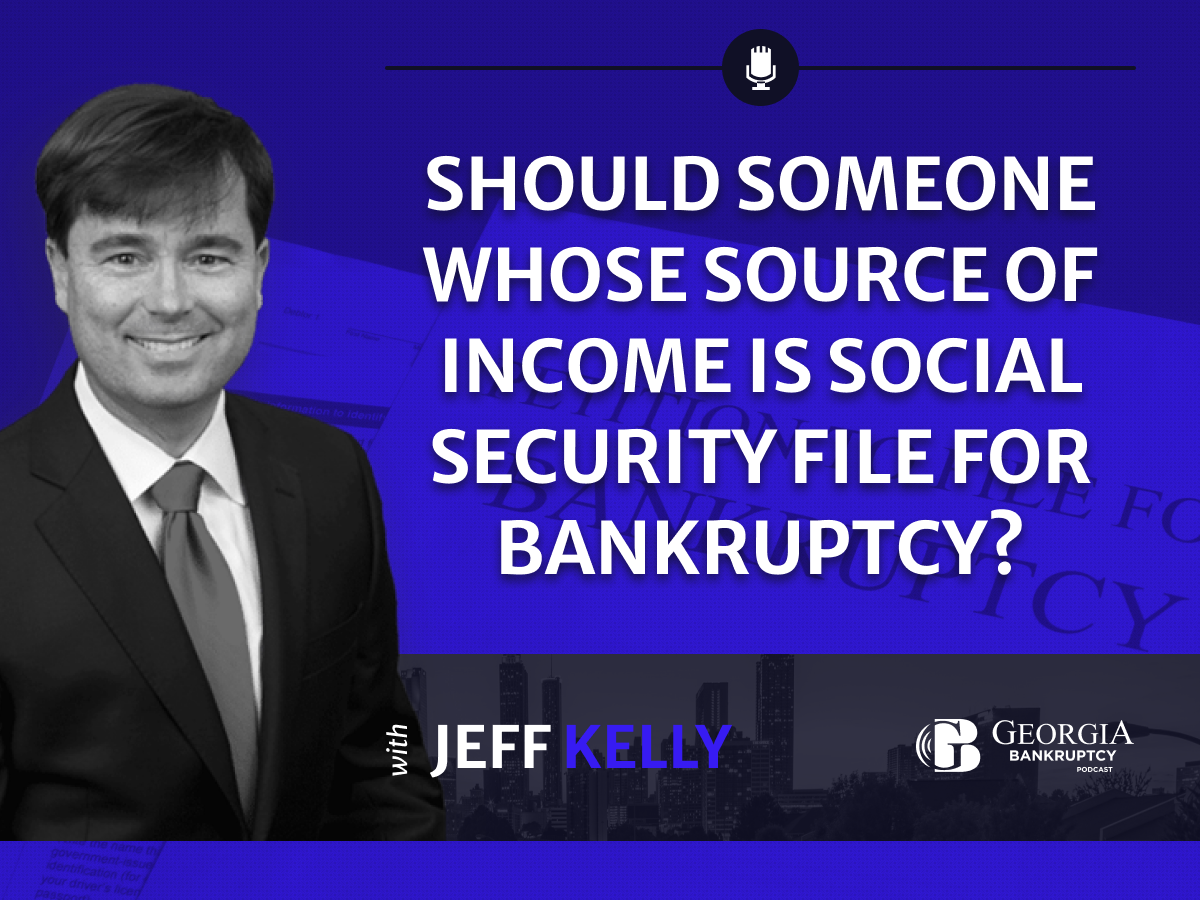
Hello, my name is Jeff Kelly. I’m a bankruptcy attorney.
And in this video, I want to talk about should someone whose sole source of income and social security but owns a house, should they file for bankruptcy. The answer to this question and all legal questions is, it depends.
So, as a general rule, I tell people, hey, if your sole source of income and Social Security don’t file bankruptcy, you know, it’s a protected stream of income your creditors, as a general rule, in almost every single case, that can’t garnish your Social Security, you’re spending it every month, you’re not letting it build up, you need that monthly income, you really don’t need to file you are technically what is called judgment proof unless you own an asset that a creditor can put a lien on, like house.
So what do you do if you’re on Social Security? And you want a house? Well, we have to consider a concept called exposed equity. What does this mean? Well, under Georgia law, if you are a single person, you can exempt $21,500, that’s it equity in your home, if you’ve got more than that, you know, the trustee could take your house, sell it, cut you a check for $21,500, and use the remaining amount to pay toward your creditors.
Now, I’m oversimplifying this a little bit for the purposes of this video to help you understand if it’s a married couple, you can exempt $43,000 in the home. So what do you do in a situation where let me just make up a number. Let’s say you’ve got someone who has $50,000 worth of credit card debt, they’re on Social Security, they cannot afford to pay back $50,000 in credit card debt. And they have a house that’s paid for outright and it’s worth about 100,000.
Unfortunately, I see this situation a lot. Because people work their entire lives to get their house paid for one of the spouses passes away. Now there’s only one person left they tend have a tendency to not adjust their lifestyle after somebody passes away. So what do they do they lean on the credit cards, the debt builds up?
What do you do so in this hypothetical, let’s say we’ve got $100,000 value in a house $50,000 worth of credit card debt? Well, a single person is only going to be able to exempt $21,500. Somebody with $50,000 credit card debt in a situation like this is probably going to be looking at a chapter 13 payment that is way too high. Because you can only you can only do chapter 13 for a period of five years. So we’d have to come up with a plan to pay back that $50,000 in credit card debt.
Over the five year period, you’re probably looking at a chapter 13 payment of more than $1,000 a month, but that’s what it would take to protect that home. Now, let me change it up a little bit, let’s say it’s $15,000 of credit card debt, let’s make it a little more reasonable. Well, in that particular situation, we’re probably going to be able to do a chapter 13 of somewhere around and again, this is just a you know, rough estimate $400 a month. And if somebody who has a house is paid for and is on Social Security, can afford it, it probably would be a good idea to file a Chapter 13 and pay all of that 15,000 on credit card debt back through the plan to protect the house.
If you don’t do anything, you know, there’s a lot there’s this misconception out there that credit card companies can’t do anything to you. If you’re on social security, and that’s not totally true. You know, it’s true, they can’t take the Social Security check. But if you own a house, they can sue you, they can get a judgment. And they can put a lien on your house. And this lien will accrue interest every single year that goes by, and that interest is going to build up and grow. And eventually it’s going to eat all of the value of your house.
So one thing that I often throw out to people stuck in this situation is how many kids do you have, you know, they’re the ones that are gonna inherit the house when you pass, could they chip in and make your chapter 13 payment to protect the equity.
If that’s not an option? Honestly, you’re better off selling the house in this situation. If you if you owe $15,000 in credit card debt, the house is worth $100,000 And you can’t afford to make any monthly payment at all toward a chapter 13 payment, sell the house, pay off the credit card debt protect your asset, otherwise they’re going to get a lien and it’s going to grow.
Another option is which I’m not a big huge fan of is you can do a reverse mortgage now the way the reverse Some mortgage companies work is they look at actuarial tables. And they can take a pretty good guess, on average of you know, when these 100 people they’re making loans to are going to die and pass away. And basically, of course, the numbers are going to work in their favor their investors, that’s the way investment works. And so basically, you get a chunk of money in a reverse mortgage situation. And when you pass your house goes to the mortgage holder. So everything’s done in reverse, but you got to look at the fine print on these.
Maybe this might be a good deal for you if you don’t have any heirs at all. But if you do, you may want to consider other options. But the bottom line is this. If you want a house that’s paid for, and you’re on Social Security, I’m happy to talk to you about the possibility of doing a chapter 13. But you don’t want to touch chapter seven with a 10-foot pole. If you’re on social security and you own a house, because if you do, there’s a very good chance that a chapter seven trustee is going to take your house, sell it and pay the debt.
And another thing that I want to point out before we go here, you got to be careful about getting into chapter seven situations, because once you file you’re not getting out. And so there’s a lot of you know, these dumb companies that try to coach people on how to file bankruptcy themselves. And these people don’t understand exemptions. And they get into a chapter seven situation and bam, the trustees got to do their job, they’re going to sell the house.
Even if you know you if you’re a pro se and you file it yourself. You can’t say all shucks, I didn’t know let me out no, there that’s that’s not going to happen. They’re they’re going to sell the house. So don’t file chapter seven. If you have a house and got it in you have exposed equity.
If you have any questions at all, give me a call at 770-881-8449 We’ve also got a website www.kellycanhelp.com You can download a free copy of a book that I wrote on a guide to bankruptcy I try to cover all of the most common questions that pop up and wish you well and give me a shout if you need some legal advice. Thank you. Bye bye.

Every week, you get to listen to our hosts respond to one of your questions submitted by one of our viewers!

Copyright © 2021 Kelly Bankruptcy Podcast | Powered by Advantage Attorney Marketing & Cloud Solutions